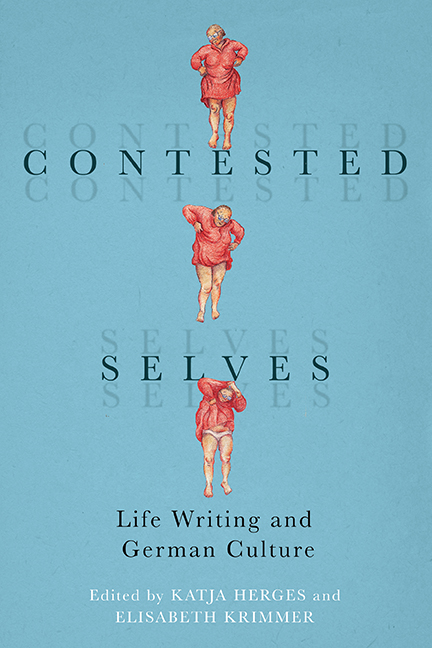Book contents
- Frontmatter
- Contents
- Acknowledgments
- Introduction
- Part I Women’s Life Writing, Female Subjectivity and Agency
- Part II Modern Life Writing and Aesthetics
- Part III Trauma and Vergangenheitsbewältigung
- Part IV Transnational and Transgenerational Life Writing in Contemporary Germany
- Bibliography
- Notes on the Contributors
- Index
7 - “Confrontation with My Complicity”: Paratextual Self-Encounters in Diaries of the Second World War
Published online by Cambridge University Press: 26 May 2022
- Frontmatter
- Contents
- Acknowledgments
- Introduction
- Part I Women’s Life Writing, Female Subjectivity and Agency
- Part II Modern Life Writing and Aesthetics
- Part III Trauma and Vergangenheitsbewältigung
- Part IV Transnational and Transgenerational Life Writing in Contemporary Germany
- Bibliography
- Notes on the Contributors
- Index
Summary
PUBLISHED DIARIES ARE often accompanied by a preface that situates the diary and provides additional context for readers. In the case of post-humously published diaries, the preface is usually written by an editor who presents a narrative of the writer's life, guarantees the authenticity of the text, or explains its publication history. Alternately, living writers may attempt to shape the reception of their diaries: Max Frisch, for example, included a short note “to the Reader” in his published postwar diary, advising that the entries should be read in order, as “Steine eines Mosaiks” (tiles of a mosaic) that build on one another. When writers publish their diaries years after writing them, prefaces or afterwords may provide evidence of the writers’ own engagement with their work at a date removed. Erich Kästner published his wartime diary in 1961 and included a prologue describing the need to look back at the past. These authorial statements create a layering of autobiographical writing—an encounter between the temporal plane of the diary, written in an evershifting present, and that of the preface, written in a retrospective mode that tethers the text to the moment of publication. This essay is concerned with this point of contact and the encounter between the past and present self as evidenced by such paratextual prefaces, commentaries, and afterwords. A paratext—a text's “accompaniment,” as Gérard Genette defines it—is “the means by which a text makes a book of itself and proposes itself as such to its readers, and more generally to the public.” When writers reframe their diaries through such paratexts, they create a link between past and present, while also positioning themselves vis-à-vis a new readership or public. In the case of unpublished diaries, this public may consist of merely a few family members, while in the case of diaries published and even translated into other languages, the audience may be a global readership. In this act of “making a book” diarists attempt to control the reception of their work and preemptively stake claims about the value of the text and how their life stories will be received. The preface is an “account of oneself,” as Judith Butler describes it, a moment of social exposure that accounts to someone, creating a “structure of address, even if the addressee remains implicit and unnamed, anonymous and unspecified.”
- Type
- Chapter
- Information
- Contested SelvesLife Writing and German Culture, pp. 147 - 166Publisher: Boydell & BrewerPrint publication year: 2021



